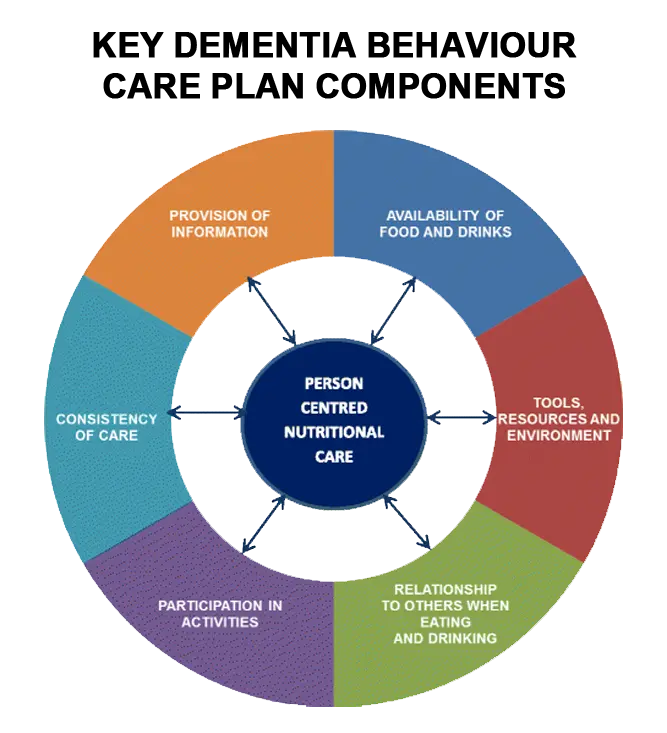Managing dementia requires a thorough and personalized strategy. Each dementia patient has unique requirements and challenges. Therefore care strategies are tailored to them. Crafting Effective behavior care plans for dementia patients explores dementia care’s complexities and tailors techniques to manage behavioral issues.
These caregiving plans are carefully designed to improve the quality of life, support, and dignity of dementia patients. We explore dementia patients’ complex routes, emphasizing the need for personalized care.
For dementia sufferers’ emotional and mental health, recognize their particular demands. We carefully create personalized care plans to improve quality of life and dignity. Dementia-related behavioral issues are our emphasis. We’ll discuss why personalized care is vital for dementia patients’ mental and emotional wellness.
Understanding Dementia and Behavioral Challenges
Dementia, an illness that causes cognitive deterioration beyond normal aging, affects people in many ways. One of its biggest effects is behavioral changes. From agitation and aggressiveness to indifference and disorientation, dementia causes behavioral issues.
Imagine a world where familiar faces are strangers and everyday chores are difficult puzzles. People with dementia often become frustrated and agitated due to disorientation. Communication problems, memory loss, and difficulty to process information worsen these issues.
Dementia patients’ behavioral issues are internal struggles. Standardized approaches fail to provide proper treatment because of this. Each person’s dementia experience is like their fingerprints, requiring customized treatment.
Why Personalized Care Plans are Crucial
In dementia care, cookie-cutter solutions fail. Effective management for this illness relies on personalized care strategies. These plans address patients’ physiological, psychological, and emotional health.
Medical experts may detect triggers, analyze behavioral patterns, and most importantly, provide a supportive environment that minimizes suffering and maximizes comfort by creating individualized care plans. These programs nurture dignity and identity despite dementia’s obstacles, not just symptoms.
Key Dementia Behaviour Care Plan Components

1. Evaluation and Assessment
Comprehensive assessments underpin dementia behavior care plans. These evaluations go beyond medical exams and examine an individual’s complex life. Provider get significant information by carefully analyzing cognitive abilities, medical history, and environmental circumstances.
Key is identifying triggers and behavior patterns. Specific locations and times of day may be triggered. Understanding these patterns permits preemptive interventions to reduce patient suffering and maximize comfort. Read More
2. Communication Care Plan for Dementia
Innovative solutions are needed to improve dementia-related communication. Slow, clear speech, basic language, and eye contact help. Facial emotions and body language often outweigh words.
Understanding that dementia patients have different needs requires modifying communication. Visuals or touch may work better than words for some. Patients feel understood and respected when language and approach are tailored to their situation.
3. Create a Comprehensive Behaviour Care Plan
Positive reinforcement creates a helpful environment. Celebrating minor wins and encouraging good behavior boosts patient emotional well-being. Encourage meaningful activities tailored to patients’ interests at the organizaion to boost purpose and fulfillment.
The care plan must include de-escalation. Understanding and responding to problematic behaviors with empathy rather than conflict defuses situations. A supportive environment requires physical and emotional adaptations to meet the patient’s demands.
Innovative Dementia Treatments
Innovative dementia treatments are constantly developed. From art and music to remembrance and sensory stimulation, these therapies try to improve dementia patients’ quality of life. We actively investigate and implement these creative methods to improve patient lives.
Effective Behaviour Care Plans
Conclusion
In dementia care, personalized and empathetic approaches matter. Every person needs to be noticed and cared for individually, with empathy and respect.
Specialized care with personalized behaviour care plan for dementia is essential for carers of dementia patients. Not simply controlling symptoms, but honoring the person behind the ailment.
Get in Touch Today
Bright Point MD’s compassionate staff can answer questions, schedule appointments, and provide further information. We care about your loved one and can explain dementia care. We can aid and understand dementia patients and their families. Consider personalized behaviour care plans for dementia today, they can improve dignity and quality of life for your loved ones.
FAQ's
Personalized behavior care plans recognise each dementia patient’s unique journey. They consider triggers, behavior patterns, and communication needs to create a calm environment. These programs emphasize dignity and individuality for holistic, effective care.
The organization starts personalized behavior care plans with thorough life evaluations. These exams determine triggers, behavior patterns, and communication tactics. Plans incorporate positive reinforcement and proactive management of problematic behaviors to fulfill the patient’s needs.
They investigate new dementia treatments. These include art, music, recollection, and sensory stimulation to improve dementia patients’ lives. Innovative methods are blended into personalized treatment programs to enrich patient experiences.
Communicating with dementia patients requires flexibility and sensitivity. Simple language, eye contact, and nonverbal indications are crucial. However, effective and meaningful communication requires adapting communication to individual needs, such as visual aids or touch.
Customized behaviour care strategies reassure and help families. It prioritizes emotional and psychological well-being as well as medical dementia. Patient comfort and dignity improve as families gain a deeper grasp of their loved one’s needs and behaviors.

